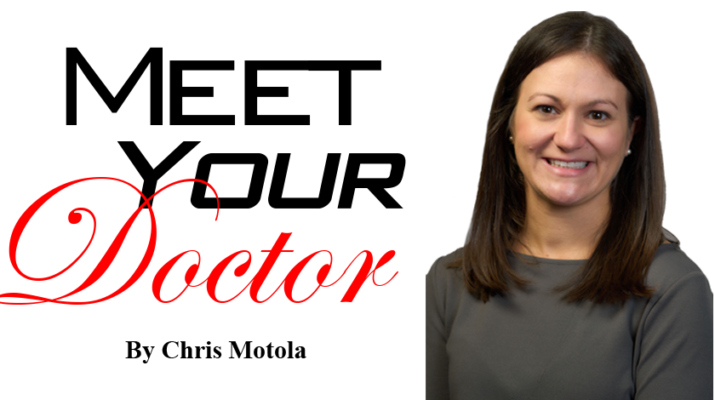By Chris Motola
New oncologist and hematologist at Hematology-Oncology Associates, who grew up in Cicero, discusses her training and the importance of a holistic oncology approach to treating cancer
Q: You’ve recently completed your fellowship at SUNY Upstate Medical Center, correct?
A: Yes, I completed it in the first quarter of this year. I did my internal medicine training at Upstate and then went on to do my fellowship there as well.
Q: What was that experience like?
A: It was a great experience. It’s the only academic center in Central New York. I had good training with great mentors throughout both my residency and fellowship.
Q: And you’re originally from the area?
A: I grew up just north of Syracuse in Cicero.
Q: Was the plan always to stay local or were you looking elsewhere in the country?
A: No, I was always planning to stay local, close to home.
Q: I don’t see the combination of D.O. and oncology that often. It’s mostly in primary care?
A: I think a lot of people are still somewhat confused about what a D.O. is. There are a few of us at Hematology Oncology Associates who are D.O.s [doctor of osteopathic medicine], so it’s not too uncommon. But there aren’t as many of us as M.D.s. Osteopathic schools are pretty much the same as M.D. schools, but the focus is a little more holistic, which may entice someone more toward a primary care path. But I think oncology can be quite a holistic specialty as well. My training didn’t swing me away from oncology and, if anything, I think it helped the foundation of me choosing that specialty.
Q: What would you consider to be a holistic approach to oncology?
A: Basically the holistic approach is mind, body and spirit. I think that’s particularly important for someone who is facing a cancer diagnosis. It’s not just about being diagnosed with a disease and treating it. It’s all-encompassing. There’s a lot of emotional support that’s needed. All of the support services that go along with it. Nutrition is vital. Family support is important as well. So a very well-rounded approach to their care is vital.
Q: You’ve also worked as an internist.
A: I worked as a nocturnist. I always loved internal medicine, but it was always a stepping stone to oncology for me. It was a chance I had to work as internist, and something I thoroughly enjoyed.
Q: What will you be doing at your new position with HOA?
A: I just joined with HOA last month. I’ve known a lot of these providers for many years. It’s a pretty small town, so we interacted with each other a lot during fellowship. I’ve developed relationships with them over the years. I’m a general hematology oncologist so I’ll be seeing patients with a variety of blood disorders as well as cancers. I don’t have a particular sub-specialty. That may change over time, but I’m happy to see any patients in need of my specialty. I truly enjoy seeing all of the potential disease processes and keeping all that knowledge fresh.
Q: Under what conditions might a patient be referred to you?
A: You can think of hematology and oncology as two separate things. There are a lot of benign blood disorders that someone might be referred for. Say if they develop anemia or some other issue with their blood count that their primary care physician has identified. And, of course, there’s the malignant disorders you’d generally associate with cancer. So if the primary care physician ordered a screening test, for example, or they’re sent our way when a patient becomes symptomatic.
Q: How has oncology changed over the course of your training? Has anything surprised you or changed your philosophy?
A: The time I was in training was both exciting and challenging, because it was hard to keep up. So here you are as someone who is training to learn about oncology but it changes day to day almost. So it’s a lot to keep up with, but it’s all good things and advances in the field. Definitely the advances that we’ve made in immunotherapy or molecular targeted treatment have made leaps and bounds over the last decade or so.
Q: Aside from receiving timely treatment, what are the most important factors in cancer survivability?
A: It’s a difficult question to answer because it’s very specific to the disease. We talk about cancer as though it’s a single disease, but it’s really a lot of different similar diseases. But they can be very different in how they behave. Catching them early is the most important thing. That’s why we talk about the importance of screening exams. That’s really the best way to avoid having a cancer that becomes difficult to treat.
Q: What attracted you to HOA in particular?
A: It’s been for a long time. It’s got a really solid foundation with a hardworking staff that are there day in and out taking care of patients. Even though patients are generally coming in for sad reasons, there’s so much camaraderie amongst the staff. I think that’s evident in anyone you speak to at HOA. We’re there to give the best care we can to patients. That’s something I saw before I joined and something I continue to see now that I have.
Q: Have you started seeing patients yet?
A: Yes, I have.
Lifelines
Name: Jill Yeager, D.O.
Position: Hematologist and medical oncologist at Hematology-Oncology Associates of CNY (HOA)
Hometown: Cicero, New York
Education: Lake Erie College of Osteopathic Medicine
Affiliations: Crouse Hospital; St. Joseph’s
Organizations: American Society of Clinical Oncology; American Society of Hematology, American College of Physicians
Family: Husband, two sons
Hobbies: Hiking, traveling, cooking, reading

